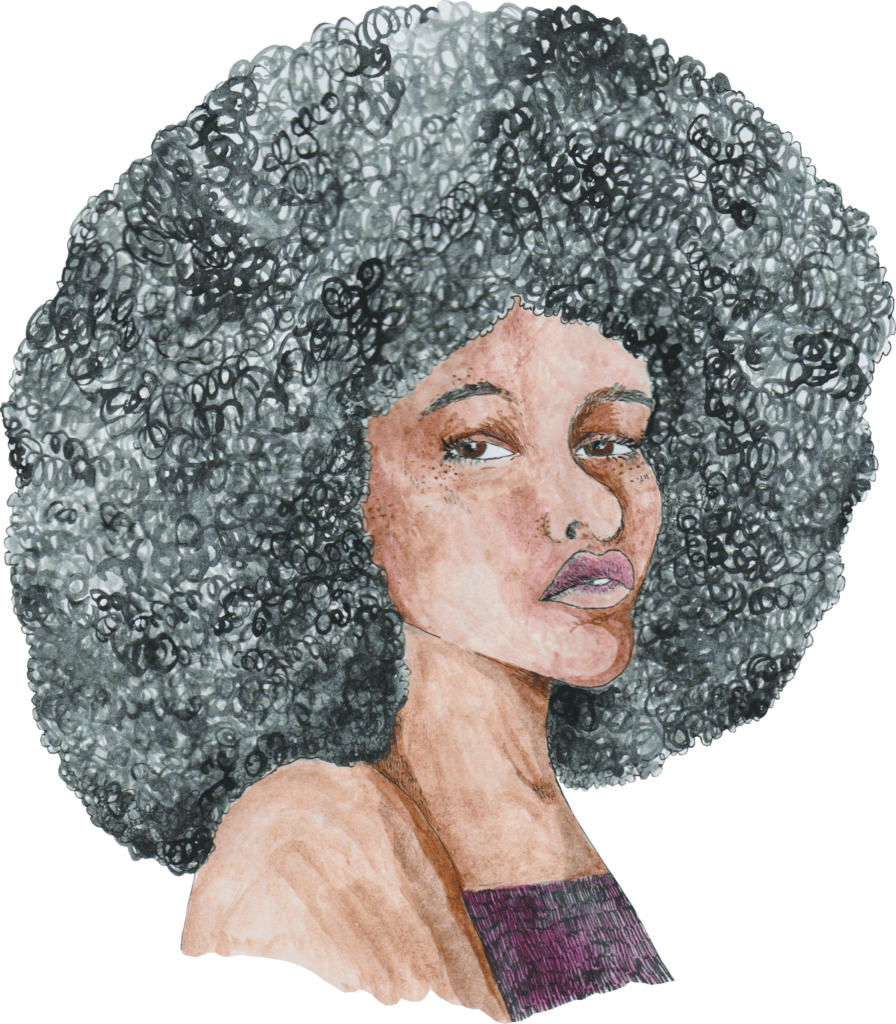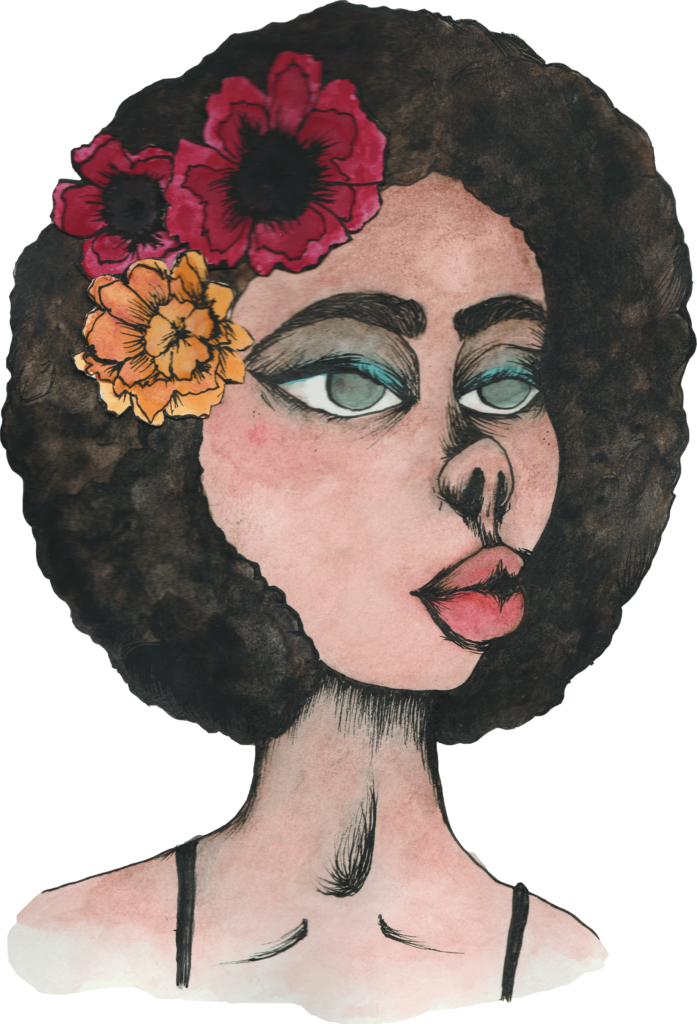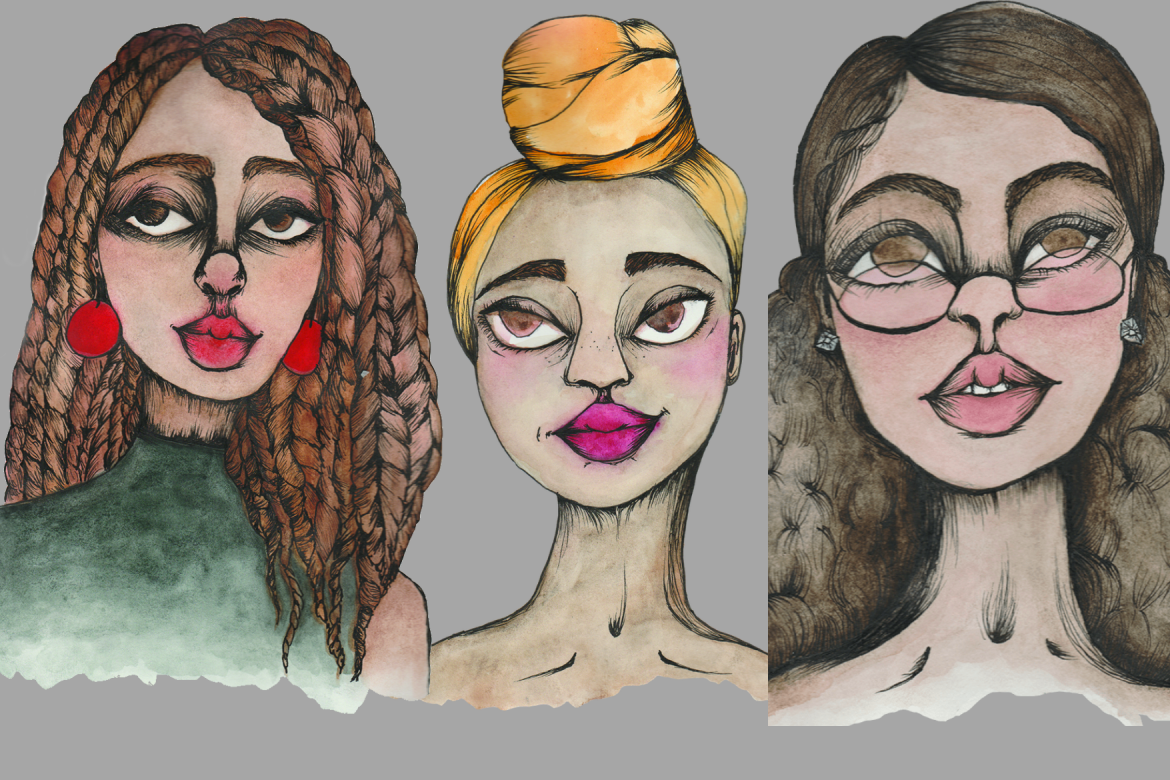Ranging from braids to kinky afros, these illustrations represent the various natural hairstyles worn by Black women. In the past decade, descriptions of natural hairstyles have evolved from adjectives such as nappy and unkempt to beautiful and authentic. Illustrations by Frances Thrasher and collage by Ireland McCage
Variety Staffers Tecoya Richardson and Sophia Long talk about their personal experiences with their natural hair.
Our hair is good hair
Variety Staffer Tecoya Richardson reflects on growing up with and evolving her views about natural Black hair.
From rusted metal combs being heated on the stovetop, to buying colored flexi rods varying in size, the African American community has always been presented with endless methods to “tame’’ their kinky, coarse and coily locks to the liking of popular demand, all in order to fit in the category of “normal”.
But in today’s society, “normal” means conforming to White or Eurocentric styles, behaviors and beauty standards.
But in today’s society, “normal” means conforming to White or Eurocentric styles, behaviors and beauty standards.
For as long as I can remember, styling my natural hair has always been a struggle. Every morning felt like a constant fight between me and my hair.

During the Civil Rights Movement in the ’60s and ’70s, a natural hair movement rose. The movement encouraged African American communities to accept their natural hair along with reject damanging products, and it’s influence can still be seen in today’s society. Illustration by Frances Thrasher
The curl pattern for natural hair ranges from 2a to 4c, with 4c being the kinkiest. Due to my 4a/4b hair pattern, I’ve broken countless combs and brushes while trying to style it.
Coming from a strictly Black background, I was taught that Black is beautiful. However, growing up in an era where relaxers were the norm and natural hair was shunned, I hated my natural hair. Because I was surrounded by the idea that my natural hair was not sophisticated, I was eager to have straight or “good hair”.
Because of my hair, I felt out of place.
Due to commercials and online advertisements from hair companies, media has taught many African American children that “good hair” is a characteristic that makes one beautiful. “Good hair” being either straight hair or loosely coiled natural hair, resembling traits of White hair.
“On average, White women show explicit bias toward Black women’s textured hair. They rate it as less beautiful, less sexy/attractive and less professional than smooth hair,” according to a survey conducted by the Good Hair Study.
I could never understand why my natural kinky hair was expected to be anything except for itself.
Given that there weren’t many natural hair products for Black girls, I was stuck using damaging and texture-altering products that dried out my hair.
Due to the shortage of natural hair products, Clarke Central High School special education teacher Stacey Scott finds buying products for her natural hair to sometimes be frustrating.

Over the last few decades in America, poplular hairstyles for African American women have constantly changed. From Diahann Carroll’s smooth curls on the 1968 show “Julia” to a surge of blonde hair in the ’90s, Black hair trends are always evolving. Illustration by Frances Thrasher
“To be real, (Black women) could honestly use all of the (Eurocentric) products, it’s just the method would be different. I wish that (brands) would communicate that a little bit better on the labels and the directions on how to use it,” Scott said. “I’m not against those products, but I wish there were more for the coiled patterned hair.”
Having relaxed hair meant that I no longer needed to spend hours detangling my hair until my arms ached, and I no longer needed to buy expensive products like deep conditioners or curling souffles to moisturize my hair.
But I regret relaxing my hair because it hurt to know that I wasn’t embracing my background.
As shown in various social media posts, blogs and mainstream media, natural hair has become more culturally accepted, but is still considered inappropriate in some work environments. Scott believes that some African Americans with natural hair tend to disguise their natural hair in the workplace.
“It bothers me that a lot of young professionals, young African Americans, are told to maybe cut their dreads or to keep their hair straight, if they’re natural,” Scott said.
In the past decade, natural hair has become more culturally accepted, but acceptance is not equivalent to appreciation.
Instead of minimizing the culture of Black hair, key figures in society should make it their mission to encourage young Black girls to not only tolerate, but to adore and cherish their natural roots.
Confonting my curls
Variety Staffer Sophia Long shares her daily struggle when it comes to styling her hair.
shampoo,
conditioner,
let it sit,
comb,
wash it out,
towel,
leave in conditioner,
water,
gel,
brush it up,
ponyta-
the hair tie broke
ponytail,
mist,
scrunchie,
*sigh*
my arms hurt.
i carry you around all day
you drip on my face
you fall off everywhere
you get tangled
and dirty
and break all my combs
and never seem to be quite right.
nappy,
unkempt,
knotted,
coarse,
dry,
damaged.
i think of combing you out but it just makes me tired,
you make me tired.
why can’t you just be straight?
or wavy?
or at least less work?
you’re so much work.
i don’t want to deal with it
so i just leave you
to get tangled
and matted
and frizzy
and sloppy.
because my scalp can’t take it,
i’m too tired,
too tired to care about the way you look.
as long as you’re up
and out of the way
i’ll deal with the looks
and the comments
and the loud whispers.
you have a mind of your own
and i’m tired of fighting you,
because you always seem to win.
This is a modal window.
Watch Variety Staffer Sohpia Long read her poem “Confronting my curls”, which is about her daily struggle with her hair.
Story by Tecoya Richardson
Video by Sophia Long
Package by Ireland McCage
